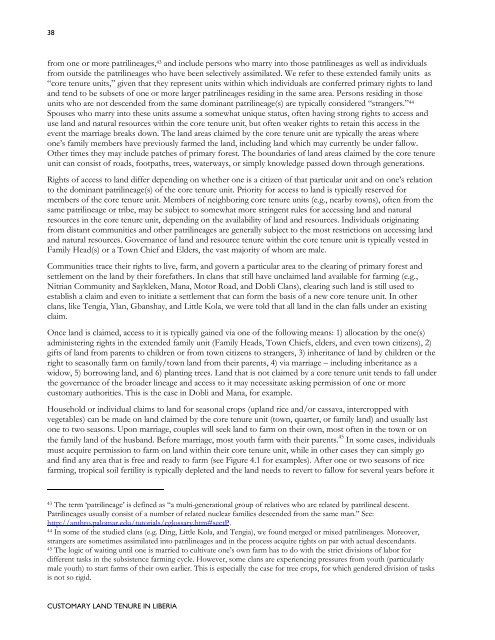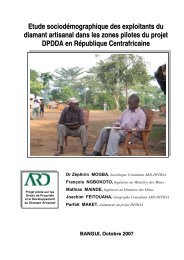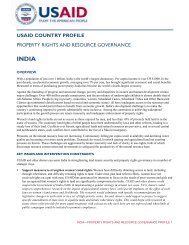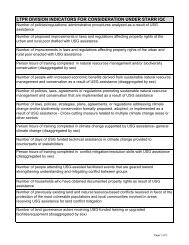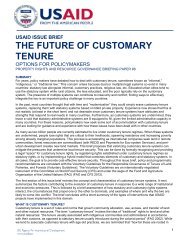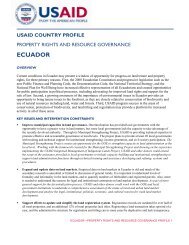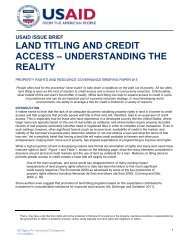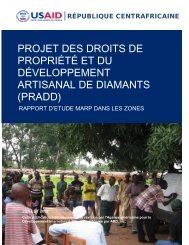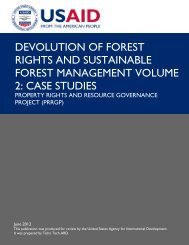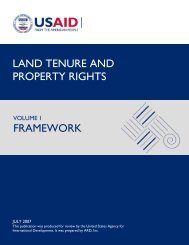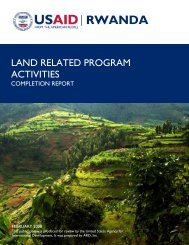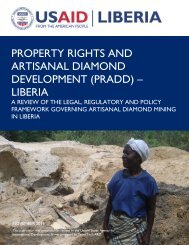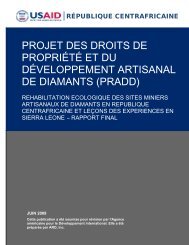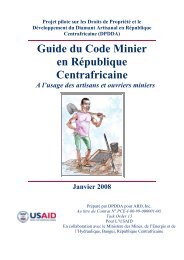Customary Land Tenure in Liberia - Land Tenure and Property ...
Customary Land Tenure in Liberia - Land Tenure and Property ...
Customary Land Tenure in Liberia - Land Tenure and Property ...
You also want an ePaper? Increase the reach of your titles
YUMPU automatically turns print PDFs into web optimized ePapers that Google loves.
38<br />
from one or more patril<strong>in</strong>eages, 43 <strong>and</strong> <strong>in</strong>clude persons who marry <strong>in</strong>to those patril<strong>in</strong>eages as well as <strong>in</strong>dividuals<br />
from outside the patril<strong>in</strong>eages who have been selectively assimilated. We refer to these extended family units as<br />
“core tenure units,” given that they represent units with<strong>in</strong> which <strong>in</strong>dividuals are conferred primary rights to l<strong>and</strong><br />
<strong>and</strong> tend to be subsets of one or more larger patril<strong>in</strong>eages resid<strong>in</strong>g <strong>in</strong> the same area. Persons resid<strong>in</strong>g <strong>in</strong> those<br />
units who are not descended from the same dom<strong>in</strong>ant patril<strong>in</strong>eage(s) are typically considered “strangers.” 44<br />
Spouses who marry <strong>in</strong>to these units assume a somewhat unique status, often hav<strong>in</strong>g strong rights to access <strong>and</strong><br />
use l<strong>and</strong> <strong>and</strong> natural resources with<strong>in</strong> the core tenure unit, but often weaker rights to reta<strong>in</strong> this access <strong>in</strong> the<br />
event the marriage breaks down. The l<strong>and</strong> areas claimed by the core tenure unit are typically the areas where<br />
one‟s family members have previously farmed the l<strong>and</strong>, <strong>in</strong>clud<strong>in</strong>g l<strong>and</strong> which may currently be under fallow.<br />
Other times they may <strong>in</strong>clude patches of primary forest. The boundaries of l<strong>and</strong> areas claimed by the core tenure<br />
unit can consist of roads, footpaths, trees, waterways, or simply knowledge passed down through generations.<br />
Rights of access to l<strong>and</strong> differ depend<strong>in</strong>g on whether one is a citizen of that particular unit <strong>and</strong> on one‟s relation<br />
to the dom<strong>in</strong>ant patril<strong>in</strong>eage(s) of the core tenure unit. Priority for access to l<strong>and</strong> is typically reserved for<br />
members of the core tenure unit. Members of neighbor<strong>in</strong>g core tenure units (e.g., nearby towns), often from the<br />
same patril<strong>in</strong>eage or tribe, may be subject to somewhat more str<strong>in</strong>gent rules for access<strong>in</strong>g l<strong>and</strong> <strong>and</strong> natural<br />
resources <strong>in</strong> the core tenure unit, depend<strong>in</strong>g on the availability of l<strong>and</strong> <strong>and</strong> resources. Individuals orig<strong>in</strong>at<strong>in</strong>g<br />
from distant communities <strong>and</strong> other patril<strong>in</strong>eages are generally subject to the most restrictions on access<strong>in</strong>g l<strong>and</strong><br />
<strong>and</strong> natural resources. Governance of l<strong>and</strong> <strong>and</strong> resource tenure with<strong>in</strong> the core tenure unit is typically vested <strong>in</strong><br />
Family Head(s) or a Town Chief <strong>and</strong> Elders, the vast majority of whom are male.<br />
Communities trace their rights to live, farm, <strong>and</strong> govern a particular area to the clear<strong>in</strong>g of primary forest <strong>and</strong><br />
settlement on the l<strong>and</strong> by their forefathers. In clans that still have unclaimed l<strong>and</strong> available for farm<strong>in</strong>g (e.g.,<br />
Nitrian Community <strong>and</strong> Saykleken, Mana, Motor Road, <strong>and</strong> Dobli Clans), clear<strong>in</strong>g such l<strong>and</strong> is still used to<br />
establish a claim <strong>and</strong> even to <strong>in</strong>itiate a settlement that can form the basis of a new core tenure unit. In other<br />
clans, like Tengia, Ylan, Gbanshay, <strong>and</strong> Little Kola, we were told that all l<strong>and</strong> <strong>in</strong> the clan falls under an exist<strong>in</strong>g<br />
claim.<br />
Once l<strong>and</strong> is claimed, access to it is typically ga<strong>in</strong>ed via one of the follow<strong>in</strong>g means: 1) allocation by the one(s)<br />
adm<strong>in</strong>ister<strong>in</strong>g rights <strong>in</strong> the extended family unit (Family Heads, Town Chiefs, elders, <strong>and</strong> even town citizens), 2)<br />
gifts of l<strong>and</strong> from parents to children or from town citizens to strangers, 3) <strong>in</strong>heritance of l<strong>and</strong> by children or the<br />
right to seasonally farm on family/town l<strong>and</strong> from their parents, 4) via marriage – <strong>in</strong>clud<strong>in</strong>g <strong>in</strong>heritance as a<br />
widow, 5) borrow<strong>in</strong>g l<strong>and</strong>, <strong>and</strong> 6) plant<strong>in</strong>g trees. <strong>L<strong>and</strong></strong> that is not claimed by a core tenure unit tends to fall under<br />
the governance of the broader l<strong>in</strong>eage <strong>and</strong> access to it may necessitate ask<strong>in</strong>g permission of one or more<br />
customary authorities. This is the case <strong>in</strong> Dobli <strong>and</strong> Mana, for example.<br />
Household or <strong>in</strong>dividual claims to l<strong>and</strong> for seasonal crops (upl<strong>and</strong> rice <strong>and</strong>/or cassava, <strong>in</strong>tercropped with<br />
vegetables) can be made on l<strong>and</strong> claimed by the core tenure unit (town, quarter, or family l<strong>and</strong>) <strong>and</strong> usually last<br />
one to two seasons. Upon marriage, couples will seek l<strong>and</strong> to farm on their own, most often <strong>in</strong> the town or on<br />
the family l<strong>and</strong> of the husb<strong>and</strong>. Before marriage, most youth farm with their parents. 45 In some cases, <strong>in</strong>dividuals<br />
must acquire permission to farm on l<strong>and</strong> with<strong>in</strong> their core tenure unit, while <strong>in</strong> other cases they can simply go<br />
<strong>and</strong> f<strong>in</strong>d any area that is free <strong>and</strong> ready to farm (see Figure 4.1 for examples). After one or two seasons of rice<br />
farm<strong>in</strong>g, tropical soil fertility is typically depleted <strong>and</strong> the l<strong>and</strong> needs to revert to fallow for several years before it<br />
43 The term „patril<strong>in</strong>eage‟ is def<strong>in</strong>ed as “a multi-generational group of relatives who are related by patril<strong>in</strong>eal descent.<br />
Patril<strong>in</strong>eages usually consist of a number of related nuclear families descended from the same man.” See:<br />
http://anthro.palomar.edu/tutorials/cglossary.htm#sectP.<br />
44 In some of the studied clans (e.g. D<strong>in</strong>g, Little Kola, <strong>and</strong> Tengia), we found merged or mixed patril<strong>in</strong>eages. Moreover,<br />
strangers are sometimes assimilated <strong>in</strong>to patril<strong>in</strong>eages <strong>and</strong> <strong>in</strong> the process acquire rights on par with actual descendants.<br />
45 The logic of wait<strong>in</strong>g until one is married to cultivate one‟s own farm has to do with the strict divisions of labor for<br />
different tasks <strong>in</strong> the subsistence farm<strong>in</strong>g cycle. However, some clans are experienc<strong>in</strong>g pressures from youth (particularly<br />
male youth) to start farms of their own earlier. This is especially the case for tree crops, for which gendered division of tasks<br />
is not so rigid.<br />
CUSTOMARY LAND TENURE IN LIBERIA


